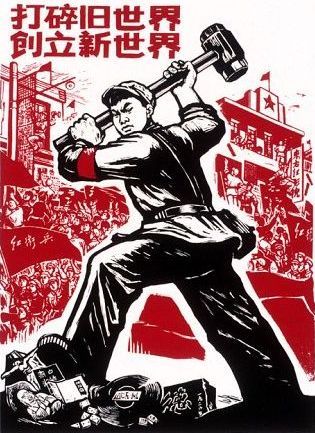
Publisher:
Bonnie King
CONTACT:
Newsroom@Salem-news.com
Advertising:
Adsales@Salem-news.com

~Truth~
~Justice~
~Peace~
TJP
Jul-01-2012 15:35

 TweetFollow @OregonNews
TweetFollow @OregonNews
Sweet and Sour: China's General Tso Economy... A Funny Thing Happened on the way to Free Enterprise
Bill Annett Salem-News.comSell when everyone is avidly buying; buy when everyone is despondently selling. - Sir John Templeton
 Courtesy: eccentricintelligenceagency.info |
(SASKATCHEWAN) - I'm old enough to remember when Shanghai and Beijing (nee Peking) were medieval towns centering 400 million people living principally off imperial largesse and rice paddies, interlaced with earnest missionaries, including the liberating diplomats, hustlers and gunboats from Britain, France, the U.S., Germany and Russia, all shouldering each other in order to strip China clean of anything visible above the poverty line.
Fast forward fifty years. Gradually, then steadily, then explosively, the sleeping Chinese giant has come awake, stimulated by the primal urges of an equally explosive population and the eye-opening medication applied by an eight-member Politburo, following in the wake of freelance deities such as Mao Tse-tung. For three decades, astonished other-world economists, jealous politicians and business apologists have been heralding the miracle of the new, emerging China. A nation now one-fifth of the world's population has arisen, conceived in state capitalism and dedicated to the preposition that at least the top 10% are created equal. That is, given the magic of massive investment by the other 90% in infrastructure, exports and a thriving oligarchy.
So what's going on these days, prompting those same international smart-money pundits to hedge their bets, predicting with horror the likelihood that China's economy may be tanking – to somewhat less than an 8% growth rate, measured by GDP (Gross Domestic Politicians).
One significant item, according to Washington's Brookings Institution, is a serious misapplication of financial resources through lack of proper planning in the enormous building frenzy, which one economist, Edward Chancellor in Boston, describes as a “Field of Dreams” misconception. (As in William Kinsella's story about Shoeless Joe Jackson: “If we build it, they will come.”
The infrastructure mania has been triggered by massive investment “in fixed assets with inadequate returns facilitated by an explosion in credit.” For instance? (1) In Hunan Province, a huge nest of soaring apartment blocks is sitting empty while Chinese law requires home and apartment buyers to pony up the full purchase price, in most cases shortly after signing their John Henley on the dotted line. (2) An aerial view of the amazing Aizhai suspension bridge reveals a huge six-lane span rivaling the Golden Gate, but which on closer inspection from a bird's-eye vantage point reveals what passes for a traffic glut in China, consisting of four automobiles and two busses, each with a lane to itself. (3) The nation's high speed bullet train system, centered in Beijing, is a technical marvel that is the envy of the world, but the fares it sells can't be scaled high enough to come close to covering its capital and operating costs. (4) Today, the population may be 1.3 billion, but two thirds of them earn less than two bucks a day – about like North America in the 1930's. As a result, China's multi-trillion dollar infrastructure today – like Yogi Berra's restaurant – is so popular that few people can afford to use it.
Overbuilt infrastructure is just one item. Meteors tend to burn out, and rocket's run out of fuel, but these are inadequate analogies for China's faltering growth rate. More basically, Paul Krugman, the prophet of Princeton who we love to cite as one of the few guys around that should be on Obama's team but isn't (maybe they don't like grizzled beards in the White House) did a brilliant take almost two decades ago on miracle Asian economies, including China's (on the way up) and Japan's (on the way down). He found the same symptoms of potential failure in both.
Both rapidly expanding economies, declared Paul, (on his way to what should have been the road to Damascus, but wasn't because then as now the right people didn't listen to him) were seriously out of whack. The potential dislocation resulted from the forced mobilization of surplus rural labor into mass industrial production, aided by huge investment in capital equipment. What was ultimately effected in both cases was a significant imbalance between labor and investment “inputs” on the one hand and output on the other; whereas a more productive approach would have been to focus on innovation and efficiency to increase the ratio in favor of production.
Such expansive economies tend eventually to hit the wall of diminishing returns, when they compete with developed countries more centered on free-market principles rather than closely controlled vested interests.
Which brings up the nature of state capitalism, over which the jury may still be out, if not actually hung. Or perhaps even well-hung, with excessive chauvinistic avoirdupois. Because it's hardly a secret that the huge state-owned business organizations in the fields of energy, telecom, steel manufacturing and even resource extraction have come to dominate throughout the Chinese economy as a result of oligopoly, government guarantees, micro levels of credit and tax breaks. Sound familiar? It gets worse.
Unlike the big-break corporations dotting the American political landscape, the degree of corruption and interplay between the economic biggies in China and the ruling party families makes the American Citizens United compact in Washington look like Christian Endeavor. “A kleptocracy of insiders,” according to Jonathan Laing, writing in Barron's Magazine, “(is) skimming off part of the prodigious money flows sluicing through the Chinese economy through relatives conveniently placed in state companies, consulting firms, and various financial institutions.”
The size and scope of this favoritism is so significant, Laing quotes William Overholt of Harvard's Kennedy School as saying, that unless it is somehow curtailed by the incoming Xi Jinping administration, China could face a prolonged stagnation period “far worse than that of Japan some 20 years ago.”
That's by no means the sum total of industrial China's problems as the country faces a decline in business expansion to a level that most developed countries – including the U.S., Brazil and Germany – would consider good news, Charley. China also faces the likelihood of a real estate bubble that would give new meaning to that over-worked collapsed metaphorical climax.
Overcapacity seems to have taken place in every area of real estate, but nowhere more dramatically than in huge urban developments. Virtual ghost cities have sprung up, notably such as the Kangbashi project where like an extended mountain range, residential apartment buildings stretch to the horizon, designed unbelievably (anywhere else in the world) to house a million people. They are currently housing a few thousand.
Last year in China residential construction accounted for more than 9% of GDP. That's a tad more than the 6% rate in the United States in 2006, just prior to the implosion that rendered the U.S. real estate industry toes- up on the table. Jonathan Laing points out that the only industrialized country to match the Chinese percentage rate of GDP has been Spain – just before the recent pain, which fell mainly on the plain.
Even the demographics don't encourage China's sustained growth rate. For three decades, China has attempted to delimit its enormous population growth with its one-baby-per-family law. Okay, so there's still only 1.3 billion people. But as a result of the low birth rate, working-age people will begin to decline in number drastically by 2015, wage rates will rise drastically because of the shortage, plus the dwindling availability of rural workers migrating to the city, and the old-age sector will expand at a rate that would turn Paul Ryan and Mitt Romney and other entitlement-averse politicians grey-haired over the prospect.
It seems that free enterprise – at least the state capitalism still favored by the Xi Jinping administration taking over sometime this year – along with the other seven guys at the apex of this Asian Disneyworld – will continue to amaze the rest of the world. But longer term, like the Japanese economy before it, it may not be all that it's cracked up (sooner or later) to be.

Bill Annett grew up a writing brat; his father, Ross Annett, at a time when Scott Fitzgerald and P.G. Wodehouse were regular contributors, wrote the longest series of short stories in the Saturday Evening Post's history, with the sole exception of the unsinkable Tugboat Annie.
At 18, Bill's first short story was included in the anthology “Canadian Short Stories.” Alarmed, his father enrolled Bill in law school in Manitoba to ensure his going straight. For a time, it worked, although Bill did an arabesque into an English major, followed, logically, by corporation finance, investment banking and business administration at NYU and the Wharton School. He added G.I. education in the Army's CID at Fort Dix, New Jersey during the Korean altercation.
He also contributed to The American Banker and Venture in New York, INC. in Boston, the International Mining Journal in London, Hong Kong Business, Financial Times and Financial Post in Toronto.
Bill has written six books, including a page-turner on mutual funds, a send-up on the securities industry, three corporate histories and a novel, the latter no doubt inspired by his current occupation in Daytona Beach as a law-abiding beach comber.
You can write to Bill Annett at this address: bilko23@gmail.com
-------------------------------
Tweet
Follow @OregonNews
 |
 |
 |
 |
 |
 |
 |
Articles for June 30, 2012 | Articles for July 1, 2012 | Articles for July 2, 2012

googlec507860f6901db00.html
Salem-News.com:



Terms of Service | Privacy Policy
All comments and messages are approved by people and self promotional links or unacceptable comments are denied.
[Return to Top]
©2025 Salem-News.com. All opinions expressed in this article are those of the author and do not necessarily reflect those of Salem-News.com.